- Home
- S J MacDonald
Karadon (Fourth Fleet Irregulars) Page 13
Karadon (Fourth Fleet Irregulars) Read online
Page 13
The telemetry connectors should have been secured together with a high tensile casing strong enough to hold them even through the massive vibration of launch and deceleration runs. It was a 50 kv cable, fifty thousand volts powering a super-conductor inner core. At some point, the connector casing had been broken. Someone had wrapped it with sticky tape to hold it together.
Alex contemplated that picture for several seconds, considering what it implied for the standard of other repairs conducted on the Demella, and made a decision.
“I want you off that ship,” he told Sam. “It’s clearly not spaceworthy; it’s beyond reasonable repair. You and your team bag up anything that looks like personal belongings. I’ll have another team retrieve the container.”
“Sir,” Sam acknowledged, sounding relieved. There was no way this ship could be made spaceworthy without being taken into spacedocks. The only way to get it into spacedocks, however, would be to decelerate sublight. Launch and deceleration put huge stress on a starship. Even a good, well maintained ship would rattle, creak and shake through a launch. This one might actually blow up. Even if it made it, the refit would cost more than the ship was worth. “I guess that explains why they’ve stayed superlight for three years, just working between ISiS.” Sam observed.
Most ISiS were actually close to inhabited worlds. On the freight side, they provided an alternative, duty-free port for long-haul freighters. On the leisure side, they were placed close enough to be reachable by yachts for weekend trips, and by liners running short-break shopping and resort cruises. It was possible for a freighter to function, as the Demella obviously had, taking on and discharging cargo and buying their supplies at ISiS, never actually going into port at all.
Alex shook his head, briefly, revising his opinion of Skipper Clemens. Perhaps he was insane, after all.
“Five minutes,” he said, and got an answering, “Sir” from the Lt.
“At least it’s handy,” Buzz commented. He was looking at the problem of retrieving the drugs. They were not conveniently in a crate-cargo hold, as with the other ships they’d searched, but packed inside a shipping container. The Demella had criss-crossed containers on their hold deck, the lower level laid lengthwise and then another layer crossways. The container which held the crates of “powdered almond” was one of those on the upper layer. “Are we going to retrieve the rest of the cargo?”
“No,” Alex said, glancing over the Demella’s manifest again. It was not carrying medical supplies or anything that would cause hardship if it was lost. “Let’s spare ourselves the paperwork.”
Buzz chuckled. They were still, even now, dealing with fallout from the Might of Teranor seizure. More than a hundred containers of legitimate cargo had ended up back at Chartsey instead of being delivered. The ship had also been subject to seizure by groundside authorities. Disputes about exactly who owned what and who owed what compensation to whom might well go on for years. “It isn’t spaceworthy,” Alex said, more seriously, “and I won’t risk anyone’s safety to retrieve cargo.”
They did get the container with the drugs in, though. This was a well-practiced manoeuvre by their own cargo shuttle. The cargo nets were released from on board ship, their shuttle engaged magnaclamp waldos around the container they wanted, Sam released the clamps that were holding it in place and they simply picked it up and flew off with it. Then they docked it into a bay that had been constructed on the belly of the frigate to carry a cargo container. As the cargo shuttle returned to its airlock, Sam’s team was reporting ready to abandon the freighter.
Alex confirmed the order for them to do so, and glanced to make sure that the hullwalker team had finished clearing debris from their damaged shuttle. They had, and were making their way back aboard ship, clomping across the hull to the nearest airlock. Glancing at the media ships, too, Alex noted that they were running directly behind them and the Demella. They would have time to avoid running into the blast, but it would be safer if they were running alongside than behind.
“Tell the media ships to move out of the blast cone, and warn them we’re about to fire missiles,” Alex said, and the tech on comms did so.
The media ships peeled apart immediately and accelerated, one of them riding high above the freighter and the frigate, the other below. Sam and his team were now docked, the hullwalkers were safely back aboard. They were still getting datafeed from the Demella’s flight deck. They’d already done a full download of its log and everything on its computer system.
Alerts were screaming on the freighter. The ship might carry on like that for quite some time, in fact, before something went so wrong that, without crew intervention, the engines would slip into dephase and blow up the ship. Looking at the sparking, erratic link between the flight computer and the engines, Alex would put that more in the realm of days than weeks. With a crew on board, rewiring short-outs and putting out fires, they might go on for months.
That ship, however, was a death trap, and Alex had no compunction about giving the order to destroy it.
“Ready missiles three, five.” He said, and got the instant response, “Ready, sir!” from the ordnance officer.
“Fire.” Alex said.
The Demella Enterprise blossomed like a fiery bouquet. Bright colours flared in the explosion as oxygen combined with metals, plastic and other gases. For one beautiful moment the freighter blazed against the stars, magnificent.
Then it went white, as it fell sublight and burst into a cloud of tachyons. The eye piercing light surged out a million kilometres in a heartbeat, then faded out of human sight. There was nothing left of it but high energy sub-particles, streaming through space.
Alex let the crew cheer that – it wasn’t every day you got to blow up a starship, after all. He was grinning, himself, a predatory gleam in his eyes. His attention was caught, though, by Lt Sam Barlow, coming onto the command deck. He was still in his cyber-suit, though he’d activated the visor and was looking a little sheepish.
It was what he was carrying that attracted Alex’s attention, though. The computer officer had a plastic tank in his hands, evidently a vivarium for the small bright green lizard inside it.
Alex looked at him. His expression said everything he wanted to say on the subject of animals on starships, and the Lt looked apologetic.
“Sorry, sir,” he said. “But I couldn’t just leave it there. And you did say, sir, to bring everything that looked like personal possessions.”
Alex couldn’t argue with that, really. He did sigh a little, but nodded.
“Take it to Dr Tekawa,” he said, and then, knowing Rangi, “Tell him he’s not keeping it.”
“Sir.” Sam grinned with happy relief. The Fleet very definitely did not allow pets aboard their ships, and he knew skippers who’d have ordered the lizard and its tank destroyed immediately as a quarantine risk. Buzz was sniggering, though he assumed a look of extreme innocence when the skipper shot a look at him.
“And don’t think I’ve forgotten that you haven’t had your med check,” the skipper said, sternly. Strictly speaking, Buzz should not have returned to duty till Rangi had confirmed that he was not performance-impaired by the shock of what had happened to the shuttle.
“Of course, dear boy,” Buzz agreed at once. “I’ll report in as soon as Rangi’s finished with more urgent patients.”
Alex couldn’t argue with that, either, so just nodded again. Then he glanced around the command deck, and at all the feeds showing crew around the ship, and grinned. Everyone looked happy, with a certain sense of expectation as they waited for him to tell them how they’d done. As if they didn’t know.
“All right,” he said, “Good job. Now let’s get back to port.”
They returned to parking orbit 8/001 just thirty nine minutes after they’d left it. Arie McKenna, still skippering the Fancy Free, signalled a salute to the frigate and, evidently spotting the damage to the shuttle hanging off the wrong airlock, an immediate enquiry, “Is everyone all right?”
The question most people were asking, though, was, “Where’s the Demella?”
They very soon got an answer to that. The media ships had raced the Heron back to port, and were not even secured in orbit themselves before they were transmitting to their offices aboard the station. Within moments, breaking news was surging out.
“They blew it up!” The journalist aboard the TNN ship said, still wild eyed from seeing that, himself. “They just blew it to bits! I don’t know if there was anyone still aboard it, or what casualties there might have been – I saw the Heron firing at the freighter, first, then they seemed to send in shuttles, three or four of them, I think. Then the Demella started firing – I know at least one of the Heron’s shuttles was hit, we could see gas venting from a hull breach, and they all pulled back to the ship. Then the Heron started firing again. I don’t know what that was. It didn’t look like normal cannon fire. It was like long, thin streaks, I’ve never seen gunfire like it before – we’ve heard rumours they’re testing some kind of secret new weapon, of course, but whatever that was, the Demella didn’t fire again. The Heron kept firing at them, though, then sent in their shuttles again. They were only on board a few minutes, with another shuttle that seemed to take one of the containers, then the next thing, we got a signal telling us to get out of the blast zone, and boom, just, boom! They blew it to smithereens, right in front of us! There’s nothing left! There’s not even any debris, it’s just gone!” He was nearly in tears, genuinely shocked and distressed. “I have no information on casualties.” He said. “But I think people may have died.”
Five minutes later, the now sharpened-up footage was broadcasting on continuous repeat, along with frantic jabbering from journalists and anyone that they could grab to interview. There was still no statement at all from the Fourth, and no response to any of the calls that were blitzing at them.
One call got through to Alex, though. The caller had his personal call-code, bypassing official comms, and when he saw who it was calling, Alex grinned a little and took a break from reading reports to answer it.
“Hello, Quill.”
“Alex!” The caller was Commander Quilleran, Second Officer aboard the Queen of Cartasay. The liner was orbiting in the seventh ring and was close enough to Heron for them to be able to have live conversation. Thanks to the inter-ring satellites, they could even have a hololink. The other man was also in his late twenties, poised and capable-looking. Just the way they were with one another made it apparent that the two of them were old friends. “Congrats, and all that,” said Quill, “but please, Alex. We’ve got people in tears, here! I know you’re doing your “strong and silent” routine, but would you please at least make a statement confirming that you didn’t kill anybody?”
Alex gave him a cool look. “And what makes you so sure I didn’t?”
Quill laughed. “Come on!” He said. “Remember the Torbane Test? You were the only one in the class who came up with a zero casualty solution!”
Alex shrugged a little, conceding the point.
“No fatalities,” he confirmed, and looked at the liner officer, half hopefully, half teasing. “I don’t suppose you’d like to act as our media liaison?”
“I would rather,” said Quill, frankly, “have my toenails pulled out with blunt pliers. But seriously, Alex, okay? We’ve got kids on this ship and they’re scared, so can you please make a statement?”
Nothing could have been more persuasive than that. Alex’s grief over the death of his own child was still a raw wound. It had made him, he found, more protective of other children, concerned about their welfare, furious with anyone who put them at risk. The realisation that children really were being frightened by what they were seeing from TNN and ABC made him grimace.
“Okay, will do,” he agreed. “But tell the kids it’s fine. We even saved the lizard.” As Quill’s eyebrows shot up, he told him, “Don’t ask. Just tell them it’s fine, we rescued everyone.”
“Rescued?” Quill queried, surprised.
For answer, Alex merely transmitted a copy of the picture of the 50 kv power cable being held together with a wrap of sticky tape. Quill looked at that, his end, and pursed his lips in a soundless whistle.
“Rescued,” he agreed, with a nod. The media would be rather harder to convince, though Alex did release that holo and other information on the state of the ship as part of the statement he made.
He had, in fact, been intending to make a statement, just as soon as he felt, himself, that he had a full picture of what had happened. That meant reviewing the recordings made at the time and the reports filed by the officers involved. At the time things were happening, there was no way any one person could be fully aware of every aspect of what was going on. He needed to have all the facts straight, he felt, before he went to the media.
It would be some time before he really had evidence he could describe as facts, as to what had gone on aboard that ship. The Demella’s skipper had not had the log set to record audio/visuals from the flight deck so the only record was of activation of controls. Jervais Clemens was saying that he’d had nothing to do with firing at the shuttles and didn’t know anything about any drugs on board, either. His reaction when told that his ship had been destroyed was to swear, once, and then ask, immediately, “Can I claim on the insurance?”
The engineer, who was drunk, was in a maudlin state and attempting to tell his life story to anyone who’d listen. Jame Jablenko was snarling obscenities and demanding a lawyer. Misha was refusing to say anything at all other than demanding to see her husband. Licia was being treated for concussion and was not yet fit to be interviewed, and Zak was so traumatised that Rangi had had to sedate him.
Alex was as sure as he could be that it had been Jame Jablenko who’d fired at their shuttles in a blaze of overwhelming rage, with his wife firing the other gun. He was pretty sure from the nature of her injuries that the seventeen year old Licia had tried to stop them, too, and that one of them, probably Jablenko, had punched her in the head.
He could not, however, make those allegations until he had rather more proof.
“We executed a search warrant on the Demella Enterprise, on compelling evidence that they had significant quantities of Class 3 drugs aboard,” he said, recording the statement in his office. He went on to explain what had happened, in official language, then said, “It was my intention to bring the Demella Enterprise back to port under arrest. Upon boarding it, however, we found that the ship was in such a dangerous state of disrepair that it was clearly not spaceworthy. Diagnostics confirmed that it was too dangerous to attempt to decelerate it to get it into spacedocks. We did not, to be clear, destroy it because it had drugs aboard. Nor did we destroy it because its crew fired at us. We destroyed it under the Navigation Hazards Act of 1532, as a vessel unfit to be operating in space, a danger to everyone aboard it and to other shipping.”
He knew even as he said that that the only people who’d understand and believe it were spacers. To groundsiders, it would just seem self evident that they must have blown up the freighter in revenge for it firing at their shuttles. The moment that it got out that Jace Higgs had been the pilot of the shuttle that got hit, too, all the human rights brigade would be screaming about him being “used as cannon fodder”, disregarding the fact that Alex’s second in command had also been aboard.
That, Alex thought, would balance out nicely the “lock em up for life!” campaigners who’d be raging over the news that the Fourth had enjoyed a first class breakfast delivered from a liner. It fascinated him how so many people could hate the Fourth for such very different reasons. He certainly wouldn’t lose any sleep over it, though. He was beyond trying to get people to understand and believe what they were actually doing. These days, he just put the truth out there and shrugged it off when nobody believed it.
Nobody but spacers, anyway. The spacers in port at Karadon already knew that the Demella was a coffin ship, in shocking condition, and it needed only one look at that picture of
a telemetry cable held together with tape for them to agree at once that he’d done the right thing. Everyone was watching as hullwalkers opened up the container, too, retrieving four crates from inside it. When it was confirmed that those crates contained, between them, half a ton of grey DPC, approval became cheering. Ships were rolling in 360 salutes, flashing signals at the frigate like Way to Go! and Brilliant!
The Fourth had been here for less than one day. They’d already seized three quarters of a ton of drugs, made a lot of friends, destroyed a dangerous ship and put on one heck of a show.
The spacers, Alex saw, were with them, and seeing that, he smiled contentedly.
Chapter Nine
Chok Dayfield turned off the holovision. There was a leaden weight in his stomach.
The Fourth had been here for less than a day. Von Strada had caused a stampede of visitors fleeing the station with his pictures of a dead girl and his threats. They kept claiming that they were finding drugs with this mysterious “secret technology” of theirs. Now they’d chased and blown up a freighter.
It would be years, decades, before Karadon could recover from this. Chok felt he had never hated anyone so much, his whole life, as he hated Alex von Strada. The man was just downright evil, destroying everything in his path.
Chok’s day was not about to get any better, either. He had just come out of a mind-numbing meeting with the legal team. They had taken two hours to tell him, essentially, that he was utterly helpless and that it would be a very bad idea to try to stall the Fourth as and when they put in extradition demands. As one of them had put it, with unusual forthrightness for a lawyer, having the legal rights of the argument would not be much consolation when he was being carried off to the Fourth’s ship in handcuffs.
There had been, again, a consensus unusual amongst lawyers that von Strada really might be capable of that, and that if the Fourth did board the station they would very likely come for Chok. They had explained, at length, the principle of command responsibility that was so important to spacers, and had advised very strongly that he not leave Karadon at all. He had been planning to go aboard the Queen of Cartasay to try to coax the passengers onto the station, but the lawyers had pointed out that the Fourth would have the arguable right to take him in for questioning if he was off the station, and an arguable right was all von Strada would ever need.

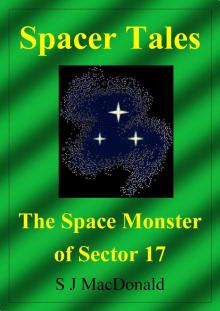 Spacer Tales: The Space Monster of Sector 17
Spacer Tales: The Space Monster of Sector 17 Spacer Tales: The Haunted Hatchway
Spacer Tales: The Haunted Hatchway Spacer Tales: The Lonely Engineer
Spacer Tales: The Lonely Engineer Spacer Tales: The Alien Monks
Spacer Tales: The Alien Monks Venturi
Venturi Spacer Tales: The Explorer
Spacer Tales: The Explorer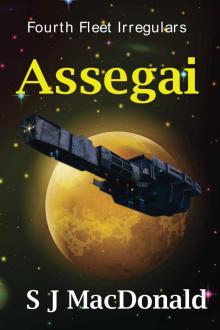 Assegai
Assegai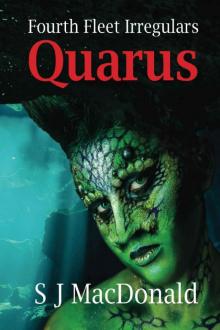 Quarus (Fourth Fleet Irregulars Book 6)
Quarus (Fourth Fleet Irregulars Book 6)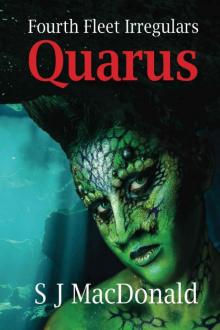 Quarus
Quarus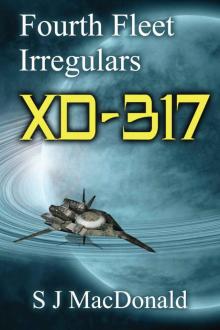 XD:317 (Fourth Fleet Irregulars)
XD:317 (Fourth Fleet Irregulars)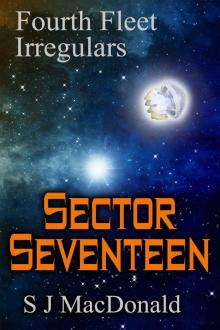 New Title 2
New Title 2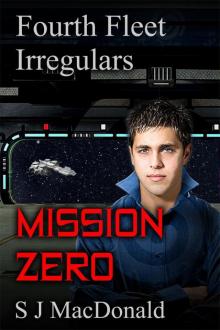 Mission Zero (Fourth Fleet Irregulars)
Mission Zero (Fourth Fleet Irregulars)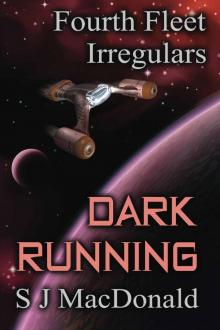 Dark Running (Fourth Fleet Irregulars Book 4)
Dark Running (Fourth Fleet Irregulars Book 4)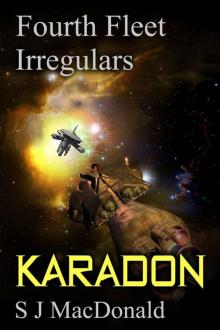 Karadon (Fourth Fleet Irregulars)
Karadon (Fourth Fleet Irregulars)